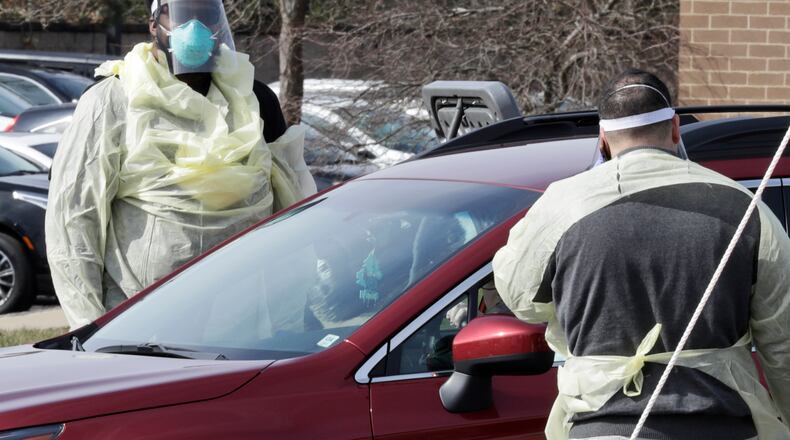In Montgomery County, the zip codes with higher cases are 45424, 45417 and 45426, including parts of Dayton, Trotwood, Riverside and Huber Heights; in Greene County, 45324 and 45385, in the Xenia and Fairborn areas; in Clark County, zip codes 45505, 45506 and 45503, in the Springfield area; and in Warren County, zip codes 45036 and 45040, which is the Lebanon and Mason areas.
Montgomery County, #Ohio. pic.twitter.com/sbpCpsUMcw
— Governor Mike DeWine (@GovMikeDeWine) June 18, 2020
Coronavirus: Complete coverage
Pop-up testing will be available in Xenia on June 24 at the Greene County Health Center and in Dayton on June 25 at the Samaritan Health Center. The governor noted that just because a care facility or workplace is seeing an outbreak of the virus doesn’t mean that they are doing anything wrong. It just means that somebody with coronavirus brought it into the facility, DeWine said.
The governor added that he will be in contact with mayors in areas with hot spots to monitor the situation.
The state also is seeing an increase in children testing positive for coronavirus. Dr. Amy Edwards said some of the increase is from an increase in testing, however, there are more symptomatic children.
Black residents and long-term care residents, such as those living in nursing homes, continue to face outsized harm from the virus and are disproportionately represented among the sick, among the hospitalized and among the dead in Ohio.
There is one case for 556 Montgomery County residents, but when broken down by race, there is one case for every 347 black residents and one case for every 866 white residents, said Public Health - Dayton & Montgomery County Commissioner Jeff Cooper. He said officials will be looking at setting up community testing sites especially in disadvantaged communities to address inequities.
“Clearly, we have a racial disparity in testing and outcomes,” Cooper said.
These are the zip codes with the highest number of cases. They are in Huber Heights, Riverside, parts of Dayton, and Trotwood. pic.twitter.com/bj2uB3jB3x
— Governor Mike DeWine (@GovMikeDeWine) June 18, 2020
There are now coronavirus testing options in Ohio for people with and without symptoms at no cost to the patient. People can contact their provider to discuss symptoms or go to coronavirus.ohio.gov and click on "testing and community health centers" and browse options for providers and test locations.
MORE: Dayton restaurants expand onto sidewalk, parking lots
Public health officials urged residents to take simple precautions to prevent the spread of the virus as more people head back to work and out in the community, such as wearing a mask when in places with close contact with other people and keeping a safe distance from people outside your household.
There have been nearly 200 coronavirus cases linked to outbreaks linked to 13 businesses in Montgomery County.
The different clusters of COVID-19 cases have been identified since April, Cooper said, speaking during a Thursday afternoon press conference hosted along with health officials from Greene and Warren counties.
It’s not just about those particular locations, and cases could happen anywhere, said Cooper.
“This is probably just the tip of the iceberg. We’re going to see more and more clusters or outbreaks in other organizations and businesses,” Cooper said.
Those organizations include:
• Community Blood Center, 11 cases
• Hospice of Dayton, 9 cases
• Respiratory and Nursing Center of Dayton, 26 cases
• Sugar Creek Brandworthy Food Solutions, 30 cases
• Crocs Distribution Center, 33 cases
• Energizer Global Auto Care, 8 cases
• Chewy Fulfillment Center, 4 cases
• Franklin Iron and Metal, 7 cases
• Minerva Bunker Gear Cleaner, 7 cases
• Friendship Village, 14 cases
• Fuyao Glass, 5 cases
• St. Leonard CHI Living Communities, 2 cases
• Dryden Road Pentecostal Church, 14 cases
• Montgomery County Jail, 3 cases
Greene County has had 44 new cases since June 1, officials said.
“A lot of that increase has to do with people are now out circulating more, they’re doing more of those things that they enjoy. Spread is happening within families. And then again, with increased capacity and testing as well,” said Deputy Health Commissioner Noah Stuby.
In Warren County, Health Commissioner Duane Stansbury said their cases have essentially doubled over the last three to four weeks, going from typically three to five cases per day to 10 to 15 cases per day. Stansbury said he expected a pop-up testing site in the county to be announced soon.
He said there’s no such thing as zero risk from COVID-19, but there are many things people can do to keep risk low, with precautions like wearing a mask and social distancing.
“We focused on what can you do to reduce the risk for both your employees and the customers that are coming into your business and doing everything you can to get that risk as low as you possibly can,” Stansbury said.
About the Author
